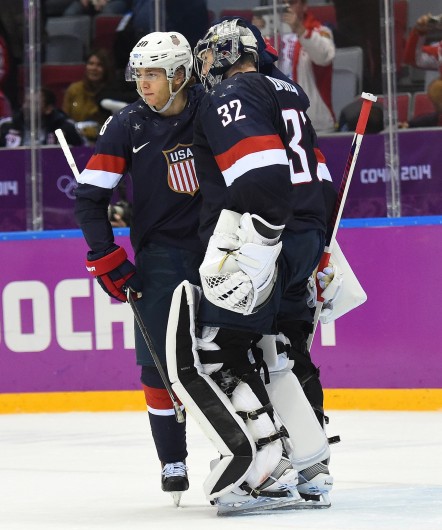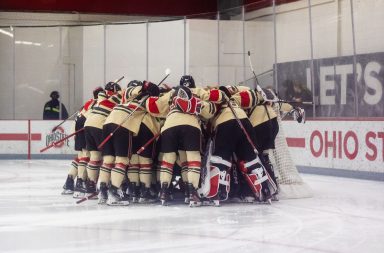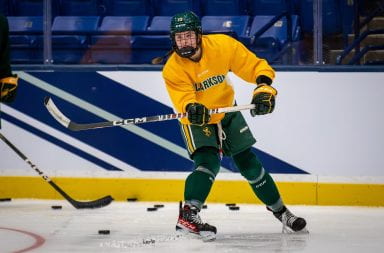
US forward Joe Pavelski (left) and goalie Jonathan Quick greet each other following their loss to Finland in the men’s Bronze Medal hockey game at the Winter Olympics in Sochi, Russia, Feb. 22. Finland defeated the US, 5-0.
Courtesy of MCT
It wasn’t supposed to end this way, was it?
That’s the question every U.S. hockey fan was asking themselves after the men’s team was shut out by Canada Friday and then Finland Saturday to depart Sochi empty-handed.
After three awesome performances in Group A of the Olympic Games — highlighted by a shootout win over host Russia — the Americans overpowered the Czech Republic to reach the semifinals against the Canadians. Everything was going according to plan.
Then it all changed: two losses, no goals scored and an overwhelming sense of unfulfilled expectations.
First came the frustration of Friday’s game against Canada, where those pesky neighbors to the north played a nearly flawless game, nullifying that esteemed American attack to win 1-0. Less than 24 hours later, with the disappointment of the semifinal defeat still clear for all to see, the U.S. sleepwalked through a 5-0 loss against Finland in the bronze medal game.
A promising Olympic adventure ended in failure, with not even a consolation prize to help ease the pain. The chance was there. They just couldn’t take it.
All of this seems that much more dispiriting because of the team’s incredible run four years ago in Vancouver, one that seemed like a seminal moment in U.S. hockey. Here was a youthful American team standing toe-to-toe with everyone it faced, even beating Canada in group play before losing to the same opponents in the gold medal game. Those silver medals the players received were more than just a reward for their efforts, they represented the growth of the American player in the NHL, a talented player on par with those produced in any other country.
Naturally, many people saw this year’s games as another stepping stone in the United States’ ascent to the top of the international hockey mountain.
This was supposed to be another memorable journey — and for the most part it was — but the margin between success and victory at the top level proved to be thin, and instead of the heroic exploits of 2010, it was the thwarted glory of 2014.
Though, when viewed through the lens of history, the fourth place finish isn’t entirely surprising. Team USA men’s hockey team has only won two gold medals (1960, 1980) and hasn’t made it to the Olympic podium in consecutive Olympics since that win in Squaw Valley in 1960. The entire men’s ice hockey competition is also somewhat unpredictable, with Finland being the only country to medal in it each of the last three Olympics (Sochi, Vancouver and Turin).
But none of those facts makes the reversal in fortunes of this year’s American team any harder to swallow. Neither does seeing Canada breeze past Sweden to win back-to-back gold medals.
In the end, Team USA was still a misplayed puck or a goaltending error away from the gold medal game, but the reality is that they didn’t do enough to get there.
Hopefully we will look back on Sochi as an anomaly, a time when things just didn’t click into place for the Americans. Or we could see it as indicative of the improvement Team USA still needs to make. Either way, expectations will once again be high when the men in red, white and blue take to the ice in PyeongChang, South Korea, in four years time.
I see no reason as to why things won’t be better, but the uncertain nature of Olympic hockey makes me hesitant to make any predictions. All I know is that if you see someone watching the games with a look of pained anticipation, it will be me. I wouldn’t have it any other way.


